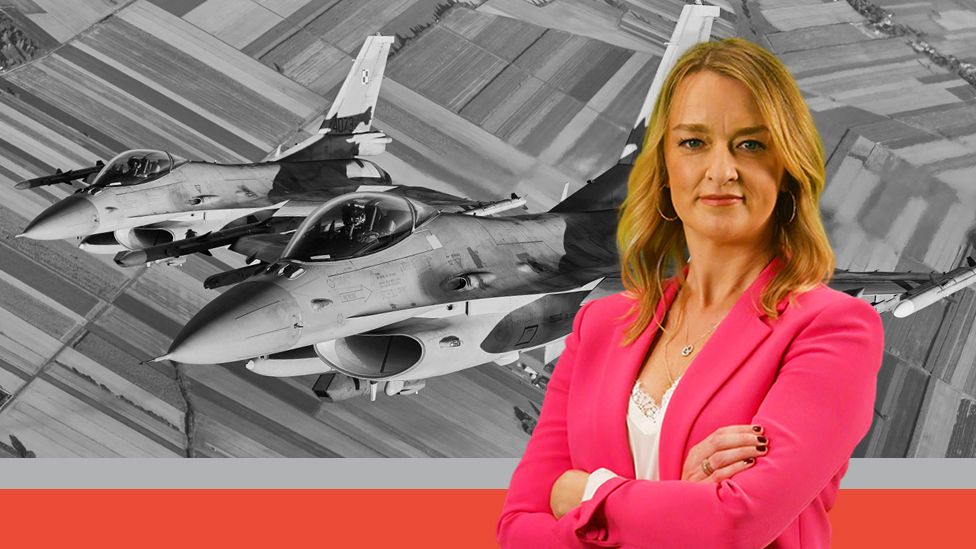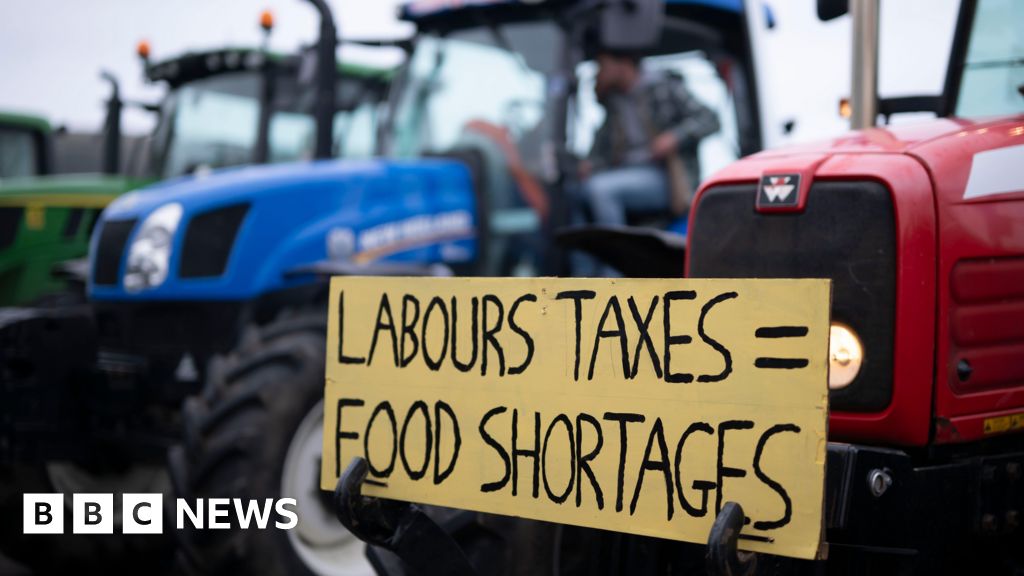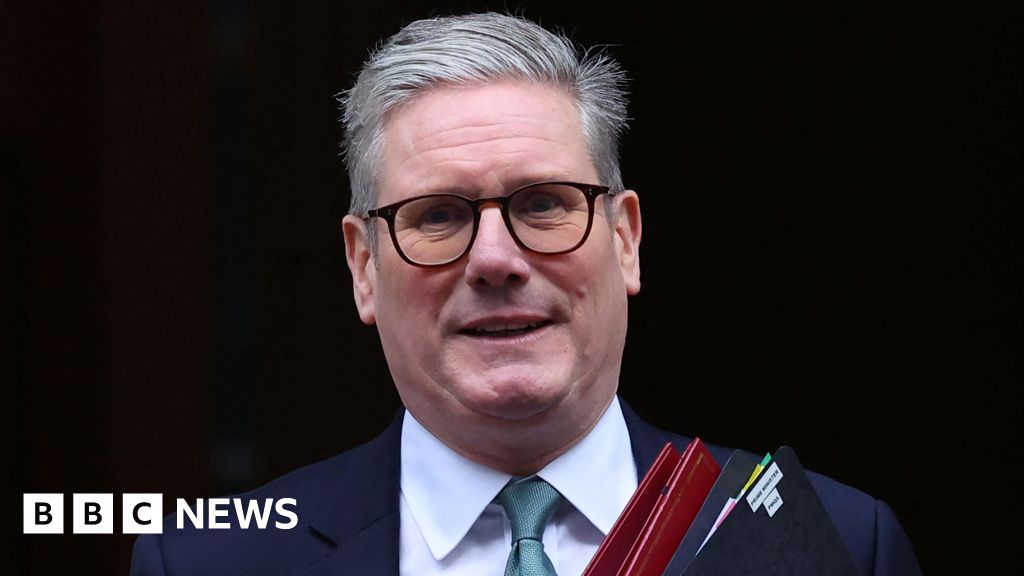ARTICLE AD BOX

By Laura Kuenssberg
Presenter, Sunday with Laura Kuenssberg
One of Ukraine's closest allies has cast doubt on whether it would be able to supply President Volodymyr Zelenksy with the fighter jets he says are needed to win the war with Russia.
Poland's President, Andrzej Duda - speaking exclusively to Sunday with Laura Kuenssberg - said sending F-16 aircraft would be a "very serious decision" that was "not easy to take".
Poland has been one of Ukraine's most vocal supporters since Russia invaded.
Last month, it was one of several countries to pledge to send more tanks, ammunition and equipment to the front line.
President Duda's comments come despite him and President Zelensky having spoken this week - at the end of the Ukrainian leader's surprise headline-grabbing European tour. In London, President Zelensky used his speech in Parliament to call for the means to help fight Russia in the air:
"I appeal to you and the world with the simple, and yet most important words - combat aircraft for Ukraine, wings for freedom."
Ukraine's leader repeated that call in Paris and then in Brussels - in a very rare departure from his country, under the tightest of security, that made headlines right round the world.
Speaking in Warsaw, President Duda told me that sending F-16 jets would pose a "serious problem" because, with fewer than 50 of the aircraft in the Polish air force, "we have not enough… and we would need many more of them."
He also stressed that combat aircraft, like the F-16s, need "very serious need for maintenance" so it's "not enough just to send a few planes".
President Duda with Laura Kuenssberg in Warsaw
With Poland being a Nato member, said Mr Duda, any decision to provide fighter jets to Ukraine had to be a "joint decision" - rather than one for any single country to take - as Western countries continue to try to coordinate their strategy to support Ukraine.
There are also nerves about whether providing planes would pull Nato directly into the Ukraine-Russia conflict - and even into war against Russia itself.
At the start of the Russian invasion in 2022, Duda said sending jets would "open a military interference in the Ukrainian conflict". But - in direct response to Ukraine's request for planes this week - the Polish leader's comments are significant.
As Ukraine's neighbour, President Duda has been one of the most ardent supporters of President Zelensky and has contributed vast amounts of military aid, becoming the main supplier of heavy weaponry - including infantry fighting vehicles and artillery, drones and ammunition.
Duda was also at the forefront of pushing other allies to promise to provide tanks in recent weeks.
Image source, Reuters
Image caption,Ukrainian President Zelensky (l) met Mr Duda in Poland on Friday at the end of his surprise European tour
After notable reluctance from Germany - and a fraught debate across Europe about the risks of escalating the conflict - Leopard tanks will arrive in Ukraine, along with Challengers from the UK and Abrams from the US.
Poland has also provided homes to millions of refugees who fled across the border at the start of the conflict.
President Duda is adamant that "weaponry has to be delivered to Ukraine all the time… it needs armaments." But it is clear he doesn't think that sending combat aircraft in large numbers is likely from Poland or any other ally - at least in the short term.
The UK also made it clear pretty rapidly that sending planes to Ukraine was not realistic in the immediate future.
Yes, PM Rishi Sunak said "nothing was off the table" while he savoured his photo opportunity with President Zelensky in front of a tank this week - jeans tucked into unlaced boots, tieless, alongside the Ukrainian leader in his familiar army sweatshirt and combat trousers.
But before too long, the Defence Secretary Ben Wallace was making plain that would mean training for pilots and other kinds of support first. No jets will take off from the UK any time soon bound for Ukraine - disappointing former PM Boris Johnson, who has been making Ukraine's case.
Image source, Getty Images
Image caption,Polish F-16 fighter jets taking part in a Nato exercise, 12 October 2022
All week, British politicians have been falling over themselves to associate themselves with the biggest political celebrity in the world right now, President Zelenksy - sharing their own blurry phone snaps of his historic speech in Westminster Hall and giving interviews about how moving it was to be there to hear him.
In Paris, French President Emmanuel Macron greeted him like a film star in front of the Elysee Palace. EU leaders then frantically tweeted pictures of their own "grip and grin" moments with the Ukrainian leader later.
There is staunch support for President Zelensky without doubt - it's not just shown in flowery language and promises of commitment. But, as President Duda explains, with guns, bullets, tanks and drones, and support for refugees - not selfies with MPs. Western allies emphasise how countries have come together to support Ukraine over this past year in a way that will have disappointed and frustrated Vladimir Putin.
Leaders, like Poland's president, underline the threat they see and feel to their own countries. Talking to him about the conflict in Ukraine, in an interview in Warsaw, is a world away from conversations in Westminster, with the Russian border at Kaliningrad only about 200 miles away.
- As well as Poland's President, Andrzej Duda, this week Laura will also speak to Foreign Office Minister, Andrew Mitchell, and shadow levelling up secretary, Lisa Nandy
- Bake Off presenter Prue Leith is also on the show
- Follow live updates, with analysis and reaction here on the BBC News website from 08:00
- Watch live on BBC One and iPlayer from 09:00
The dilemma over jets is another example of the fraught calculations our leaders face. What is practically possible in terms of supporting Ukraine? And what is politically and diplomatically viable, without provoking a wider war?
Poland and other countries' firm backing does not mean that the West, or even Ukraine's closest allies, will or can say "yes" to his every request. One senior Ukrainian [is this right?] diplomatic source suggests President Zelensky is, of course, well aware of this.
His headline-grabbing journey this week was not just about the jets, and it doesn't look like it will soon result in "wings for freedom". But - as we approach the anniversary of Russia's invasion - his European tour's careful choreography, and powerful imagery will have reminded not just Western politicians but also their publics, of what is at stake.

 1 year ago
35
1 year ago
35








 English (US)
English (US)